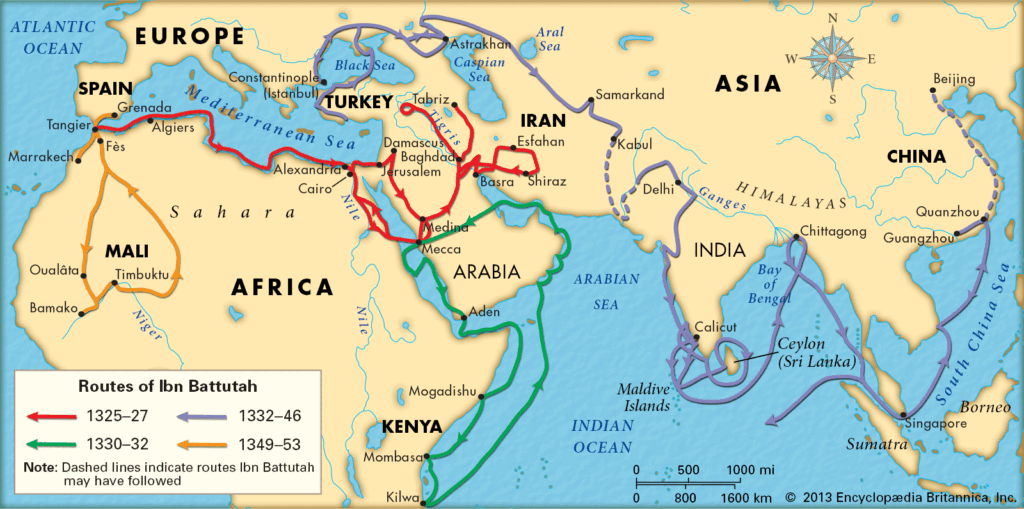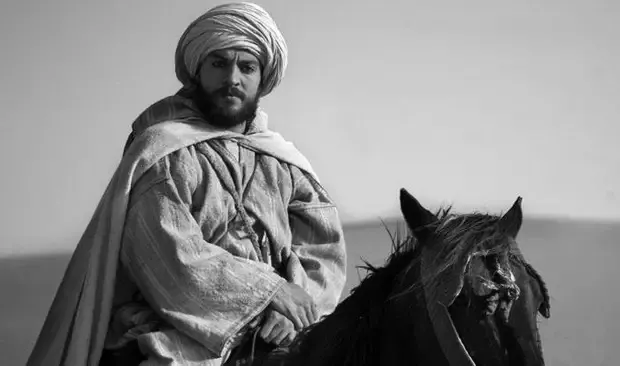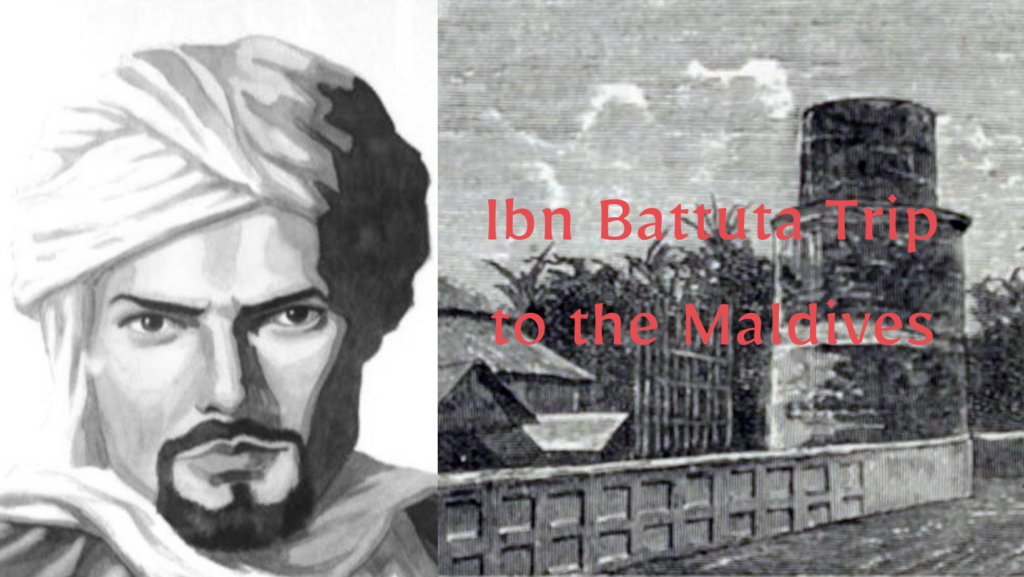Sunday, May 22th 2022
Ibn Battuta, born in 1304 in Tangier, Morocco, was of Amazigh descent and is widely regarded as one of the most iconic adventurers in Islamic civilization. He was a brilliant geographer who combined his knowledge of Sharia, diplomacy, and geography in an empirical and descriptive sense. Over the course of almost three decades, he traveled the world without hesitation and was known for his courage, boldness, and adventurous spirit. Despite the many dangers he faced, he possessed both physical strength and a strong moral commitment. Additionally, Ibn Battuta had a penchant for seeking notability and status wherever he traveled.
Ibn Battuta traveled extensively throughout the Islamic world in the 14th century. One of his most fascinating journeys was his trip to the Maldives, a group of 1192 islands located in the Indian Ocean. We will explore here Ibn Battuta’s journey to the Maldives, focusing on his cultural exchange and adventure during his stay on the islands.
From India to the Maldives
As part of his travels, Ibn Battuta had visited China and Indonesia (Java), then India, which was ruled by the Mamluk Mongol princes, headed by Sultan Ibn Tughluq Shah. Ibn Battuta had met one of the local princes in India, named Prince Jamal al-Din, who seemed to have been in control of large areas in southern India, and was a man who loved spreading Islam. Ibn Battuta accompanied him and went with him on military campaigns against the Hindus and others. However, this conflict ended tragically when the Hindus emerged victorious, and when “hands seized the spoils, and my companions scattered to China, Java, and Bengal,” as he says. He became despondent and decided to search for new lands to live in.

These lands were the Maldives islands. Ibn Battuta had heard stories about the Maldives and immediately decided to embark on a journey to the islands. He boarded a ship headed to the Maldives and arrived there ten days after leaving the southern coasts of India in the months of 745 AH/1344 CE.
In fact the Muslims, particularly their traders, had been aware of the Maldives since the late first century AH. The commercial sea voyage between the Arabian coasts in Yemen, Oman, and southern Iran, and the islands of Southeast Asia and China used to last a year and a half, and the Maldives were situated approximately in the middle of this distance. Muslims used to consider it a place for transit and for relaxation and preparation before resuming their journey back and forth. According to some historians, the Maldives Kingdom converted from Buddhism to Islam, with credit given to the Moroccan traveler Abu Al Barakat Yusuf Al Barbari and Sheikh Yusuf Shamsuddin Al Tabrizi. Sources indicate that the conversion of its people and its king to Islam was accomplished by these missionary travelers in the year 548 AH/1154 AD.

Ibn Battuta’s Arrival in the Maldives
Ibn Battuta arrived in the Maldives in the year 1344, at a time when the islands were ruled by the Buddhist king, Siri Fennaadheettha. The journey to the Maldives was arduous, and Ibn Battuta traveled by ship, encountering rough seas and adverse weather conditions. However, his spirit of adventure kept him going, and he arrived in the Maldives eager to explore the islands and learn about the local culture.
Cultural Exchange in the Maldives
Ibn Battuta was immediately struck by the unique social structure of the Maldives, which was characterized by a system of caste-based hierarchy. The ruling class was made up of Buddhist priests who held significant power and influence over the rest of the population. Ibn Battuta also noted the Maldives’ advanced system of irrigation, which allowed for the cultivation of crops despite the islands’ lack of natural resources.
One of the most fascinating aspects of Ibn Battuta’s trip to the Maldives was his immersion in the local culture. He learned the local language and befriended the locals, sharing in their daily activities and experiencing life as a Maldivian. He was particularly intrigued by the Maldivian tradition of Bodu Beru, a type of drumming and dancing that he described as “the most joyous thing in the world.”
It seems also that the Arabic name for the island of “Dhibat al-Mahl” is actually a reversed version of its current known name, Maldives (Mal – Dib). Mal or Mahl is the capital of the islands, and all the islands are under its jurisdiction (Male’ today). According to Ibn Battuta, most of these islands were not cultivated, but they used to grow some grains that resemble tobacco, which is a small corn. The people of the Maldives relied on fish as their main food source, and the most famous fish is called “Diamond Heart,” which is known today as Maldivian fish. There are two types of it, one is called bonito, and the other is tuna. They used to dry it and make it smoked fish, and export it. They also have many coconut trees, which are the coconut palms.
Ibn Battuta’s Encounter with a Sea Monster
One of the most thrilling episodes of Ibn Battuta’s journey to the Maldives was his encounter with the Rannamaari, a Maldivian sea monster. While he was swimming in the ocean, he saw a large sea creature with a head resembling that of a buffalo. The creature reportedly had sharp teeth and was so large that Ibn Battuta initially mistook it for an island. Ibn Battuta records the legend of sea monster described as a demon who was appeased through sacrifices. The king would select a virgin girl every month to be sent to the dwelling of the creature as tribute.
Some scholars believe that it may have been a giant octopus or squid, while others speculate that it could have been a whale or a large shark. Regardless of the creature’s identity, Ibn Battuta encounter has captured the imaginations of people for centuries and continues to be a subject of fascination to this day.
The Great Hospitality of the Maldivians towards Ibn Battuta
Upon Ibn Battuta’s arrival in the Maldives, the locals were amazed by the arrival of a Scholar hailing from the lands of Islam and Arabia. His reputation and high status had preceded him, thanks to his work as a judge and distinguished ambassador for the great Indian sultans. In light of his esteemed background, the Sultan of Maldives appointed him as a judge over all the islands and subjects under his rule, thus elevating his status to a high position.
Ibn Battuta then made a request: “If you want me to take up my position, I have some conditions.” They accepted his conditions, and he continued, “I cannot walk on my feet, and it is customary that nobody rides except for the minister.” After being provided with a horse, Ibn Battuta rode it, and people followed him, admiring him. Although their custom only permitted the sultan and the minister to ride horses, they gave Ibn Battuta the authority to be a man of state, akin to a king among them. They bestowed him with gifts of orchards and money and ensured his orders were respected among them.

During his stay in the Maldives, Ibn Battuta lived like a king and was held in high regard by the people of the islands. As a renowned traveler and scholar, he was seen as a valuable guest, and was treated with great respect and hospitality. He was granted an audience with the Sultan of the Maldives, who received him with open arms and gave him the title of “Amir al-Hajj” or the Prince of Pilgrims. Ibn Battuta was also given a house on the island of Thinadhoo, where he lived in luxury, enjoying the finest food and drink that the Maldives had to offer. He spent his time studying and observing the local culture, and engaging in trade and commerce with the people of the islands. His travels and experiences in the Maldives are a testament to the enduring spirit of adventure and cultural exchange that has been a hallmark of human history.
In what way did the Maldivians become hostile towards Ibn Battuta and what caused this change in attitude towards him?
Ibn Battuta had married a woman from the Sultan’s household, specifically the wife of the father of the previous Sultan, who was considered one of the finest women. However, his stay in the Maldives was cut short due to the envy of the minister Abdullah bin Muhammad al-Hadari, whose animosity towards him worsened when Ibn Battuta did not rule in the manner he desired in certain cases related to him. As a result, the minister told him that his sole intention was to travel away from them and requested that he pay off the debts of the people and give charity from the women before leaving. Ibn Battuta complied and settled his debts, but despite being previously treated with generosity and kindness by the minister, he suddenly became fearful of him. When Ibn Battuta expressed his desire to leave, the minister regretted his actions and delayed granting him permission to depart. Frustrated, Ibn Battuta swore by the strongest oaths that he must travel, and he relocated all his belongings to a mosque by the sea. Additionally, he divorced one of his wives who happened to be pregnant.
The End
Thus ended Ibn Battuta’s journey to the Maldives after a year and a half of his arrival, due to the hostility of the minister towards him. Ibn Battuta had reached a prestigious position in the hearts of everyone and his authority on the island was comparable to that of the Sultan and the minister. However, Ibn Battuta did not rule in the way that the minister wanted and spoke harshly to him in front of everyone. Ibn Battuta then decided with utmost simplicity to leave everything behind and return once again as a wandering traveler in the land of God, to begin a new story and a strange adventure as he has accustomed us in his travels.
In conclusion, Ibn Battuta’s journey to the Maldives was a remarkable adventure that allowed him to explore a new culture and experience life on a group of islands that were quite different from his home in Morocco. Ibn Battuta’s encounter with the sea monster adds an element of excitement and mystery to the story, making his journey to the Maldives all the more memorable.


